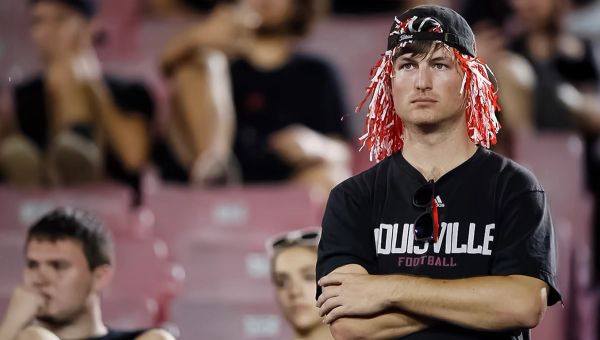Why Your Brain Wants You to Chase Losses (And How to Shut It Down)


HotTakes
Let's talk about the moment every bettor knows too well.
You're down $200. Not terrible, but it stings. You tell yourself one more bet will get you even. Just one solid play to erase the damage and walk away clean. But that bet loses too. Now you're down $350. The rational voice saying "stop" gets quieter while another voice gets louder: "You NEED to get it back."
Welcome to loss chasing—the single most expensive psychological trap in sports betting. And here's the brutal truth: your brain is literally designed to push you into it.
But understanding
why
your brain does this is the first step to beating it. Let's break down the psychology that makes loss chasing so powerful, spot the warning signs before they wreck your bankroll, and build systems that protect you from yourself.
The Psychology Behind Loss Chasing: You're Fighting Evolution
Loss Aversion Is Hardwired Into Your Brain
Here's what's happening in your head when you're down money: your brain treats losses roughly twice as intensely as equivalent gains. Win $100? Nice dopamine hit. Lose $100? Your amygdala (the emotional center of your brain) lights up like Times Square.
This isn't a character flaw—it's called
loss aversion
, and it's a cognitive bias that helped our ancestors survive. In prehistoric times, losing resources (food, shelter, protection) could literally kill you. Your brain evolved to avoid losses at almost any cost.
The problem? That ancient survival mechanism doesn't know the difference between losing your tribe's food supply and losing your Sunday parlay. To your amygdala, they're both threats that must be eliminated
immediately
.
Why this matters for betting:
When you're losing, you're not making rational decisions—you're operating in threat-response mode. The prefrontal cortex (the logical part) gets overridden by the emotional centers screaming "FIX THIS NOW." That's why the same person who spent three hours researching their morning bets will throw $500 on a random night game just to "get even."
The Sunk Cost Fallacy Makes It Worse
Your brain doesn't just hate losses—it refuses to accept them. This creates the
sunk cost fallacy: the belief that you can't walk away because you've already "invested" too much.
Lost $200? Your brain says: "That money isn't really gone if you win it back." But here's the reality: that $200 is already gone. Every new bet is an independent decision with its own probability of winning or losing. Yesterday's losses have exactly zero impact on today's odds.
Professional bettors understand this. Casual bettors don't. That's why pros can lose $2,000 on Sunday and still make disciplined plays on Monday—they've mentally closed the book on those losses. Meanwhile, the casual bettor who lost $200 is making increasingly desperate plays trying to "make it back."
The Gambler's Fallacy: "I'm Due"
After a string of losses, your brain starts whispering: "The universe owes me a win. I'm due." This is the
gambler's fallacy
—the belief that past results influence future outcomes in independent events.
Flip a coin and get tails five times in a row. What are the odds of heads on the sixth flip? Still 50/50. But your pattern-seeking brain sees those five tails and thinks "heads is coming."
In sports betting, this manifests as: "I've lost my last six bets, so this one HAS to hit." But Vegas doesn't care about your losing streak. The Bucks don't cover against the spread more often just because you've had a rough week.
Recognizing the Warning Signs: How to Spot the Chase Before It Starts
Loss chasing doesn't usually announce itself. It creeps in gradually, disguised as "one more solid play" or "just getting back to even." Here's how to recognize it before it becomes expensive:
Red Flag #1: Betting Outside Your System
You have a process. You do research, analyze matchups, wait for value. Then you lose a few bets and suddenly you're betting a mid-week MACtion game you know nothing about because "that line looks soft."
What's happening: Your emotional brain is hijacking your decision-making process. When you start making bets that don't fit your normal criteria, you're chasing.
The fix: Before placing any bet, ask yourself: "Would I make this exact play if I were up $500 today?" If the answer is no, you're chasing.
Red Flag #2: Increasing Bet Sizes After Losses
Your typical unit is $50. You lose three bets. Now you're putting $200 on the next game to "make it back faster." This is chase behavior wearing a strategic mask.
What's happening: Loss aversion is convincing you that bigger bets are justified because you're "recovering" rather than "gambling." But bigger bets when you're emotional is how bad days become disastrous weeks.
The fix: Your unit size should be based on your total bankroll, not your recent results. If you're tempted to bet more after losing, that's the exact moment to bet less (or take a break entirely).
Red Flag #3: The "Just Get Even" Mindset
"I just need to get back to even, then I'll stop." This sentence is the death rattle of bankrolls. Why? Because "even" is an arbitrary number your emotional brain is fixating on. Once you get there, you won't actually stop—you'll want to get
ahead
.
What's happening: Your brain is creating a false goal that justifies continued betting. It's the same mechanism that makes people say "just one more episode" at 2am.
The fix: Accept that some days you lose. Your goal isn't to end every day at zero—it's to make +EV decisions over time. Today's losses are irrelevant to whether tomorrow's bet is smart.
Red Flag #4: Betting on Sports/Leagues You Don't Follow
You've been betting NFL all season with a solid process. You lose your Sunday card. Now you're suddenly betting Europa League soccer at 3pm on a Thursday. You don't watch soccer. You can't name three teams in the league. But that line "looks off."
What's happening: Pure desperation. When you start betting on unfamiliar territory just because games are available, you're not analyzing value—you're feeding a compulsion.
The fix: Stick to your sports. If you've run out of games in your wheelhouse, that's not a problem to solve with random bets—it's a sign the betting day is over.
How to Shut Down the Chase: Practical Systems That Work
Understanding the psychology is step one. Building systems that protect you from it is step two. Here's how to create friction between your emotional brain and destructive decisions:
Strategy #1: Pre-Set Stop-Loss Limits (And Actually Follow Them)
Before you place your first bet of the day, decide: "If I'm down $X, I'm done betting today." Write it down. Tell a friend. Set a phone reminder. Make it concrete.
Why it works: You're making this decision when your prefrontal cortex is in control, not when your amygdala is screaming. Future-you is way smarter than emotional-you.
Implementation:
Set a daily loss limit at 2-3 units maximum
When you hit it, close the app, log out of the site, remove payment methods
Build in a 24-hour cooldown before you can bet again
Track your adherence—if you're breaking your own limits regularly, that's a red flag
Pro tip: Make it harder to override your limits. If you use multiple sportsbooks, put them on different devices. Add steps between impulse and action.
Strategy #2: The 24-Hour Rule for Revenge Bets
Had a brutal loss? Feel the urge to "make it back" immediately? New rule: wait 24 hours before placing another bet.
Why it works: Time creates distance from emotional decisions. What feels urgent and necessary at 10pm Sunday rarely feels the same at 10pm Monday. The 24-hour gap lets your rational brain catch up to your emotional brain.
Implementation:
Set a phone reminder for 24 hours after any significant loss
Use that time to analyze what went wrong (process vs outcome)
Journal your feelings—writing down the urge to chase often deflates it
If after 24 hours you still want to make the bet, it's probably more rational
Important: This isn't about "cooling off" as punishment. It's about making better decisions. Professional bettors take breaks after losses not because they're weak, but because they're disciplined.
Strategy #3: Bankroll Separation (Physical and Mental)
Your betting bankroll should be completely separate from your living money. Not just on paper—actually separate accounts, separate cards, separate everything.
Why it works: When losing your betting money doesn't threaten your rent, groceries, or lifestyle, it's easier to make rational decisions about it. The stakes literally change.
Implementation:
Open a separate checking account for betting only
Fund it monthly with an amount you can genuinely afford to lose
Never transfer additional funds within the same month
If the bankroll hits zero, you're done betting until next month
Keep your regular debit/credit cards physically away from betting devices
The deeper psychology: This creates a mental firewall. "Betting money" becomes different from "real money" in your brain, which paradoxically helps you respect both more.
Strategy #4: Track Every Bet (Especially the Bad Ones)
Keep a detailed betting log that includes: date, sport, bet type, amount, odds, reasoning, and result. But here's the key: also track your
emotional state
when placing the bet.
Why it works: Pattern recognition. When you can look back and see "every time I bet while down $200+, I lose," that data becomes powerful motivation to stop the chase.
Implementation:
Use a spreadsheet or betting tracking app
Rate your confidence (1-10) and emotional state (calm/anxious/frustrated)
Weekly reviews: calculate ROI by emotional state
Identify your "danger zones" (time of day, loss thresholds, specific situations)
What you'll discover: Your best bets are almost always made when you're calm and methodical. Your worst bets cluster around emotional states and chase scenarios. That pattern becomes impossible to ignore.
Strategy #5: Build in Accountability
Tell someone you trust about your limits. Give them permission to call you out. Better yet, make it harder to chase by creating external barriers.
Why it works: Social accountability and external friction make impulsive decisions harder. When you have to explain your "just one more bet" logic to another person, it often falls apart.
Implementation:
Share your daily/weekly limits with a friend who won't judge
Use sportsbook features like deposit limits and self-exclusion periods
Set up two-factor authentication requiring another person's code
Join responsible gaming communities where people understand the struggle
Real talk: If the idea of someone knowing your betting behavior makes you uncomfortable, that discomfort is worth examining. Secrecy often enables destructive patterns.
When "One More Bet" Becomes a Real Problem
Everything we've covered helps prevent loss chasing from wrecking your bankroll. But there's a harder conversation we need to have: sometimes loss chasing isn't just poor bankroll management—it's a symptom of gambling addiction.
Warning signs that it's more than a bad day:
You're chasing losses with money you can't afford to lose
You've lied to friends/family about betting losses
You've borrowed money or sold possessions to keep betting
You feel anxious or irritable when you can't bet
Betting is affecting your work, relationships, or mental health
You've tried to stop or set limits but can't stick to them
If you're nodding at multiple items on that list, the strategies in this article—while helpful—aren't enough. You might be dealing with problem gambling, and that requires actual professional support.
This isn't failure. It's recognition.
The same brain chemistry that makes loss chasing hard for everyone makes it nearly impossible for some people. That's not a character flaw—it's how addiction works.
Resources that actually help:
National Problem Gambling Helpline: 1-800-522-4700 (call/text, 24/7)
Gamblers Anonymous: Free support groups (in-person and virtual)
NCPG Chat: ncpgambling.org/chat (live support)
Self-exclusion programs: Most states allow you to ban yourself from sportsbooks
These resources exist because gambling addiction is common and treatable. Reaching out isn't admitting defeat—it's taking back control.
Bottom Line: Your Brain Is Wired to Chase, But You Don't Have To
Loss chasing feels logical in the moment because your brain is literally designed to avoid losses at any cost. But "any cost" in prehistoric times meant "whatever it takes to survive," not "destroy my bankroll trying to get even on a random Tuesday night game."
The smartest bettors aren't the ones who never feel the urge to chase—they're the ones who recognize it and have systems to stop it. They pre-commit to limits, build in friction, track patterns, and accept that some days you just lose.
Remember: The goal isn't to win every day. It's to make good decisions consistently over time. Yesterday's losses don't matter to tomorrow's odds. And the bet that gets you "back to even" is almost always the bet that makes things worse.
Your brain wants you to chase. But you're smarter than your brain's factory settings.
Build systems. Respect limits. Protect your bankroll.
Because the best bet you can make when you're down is often no bet at all.
Need help building better betting habits?
Download the HotTakes app to track your plays, connect with a community focused on smart betting, and develop the discipline that separates long-term winners from everyone else.
If you or someone you know is struggling with gambling addiction, call the National Problem Gambling Helpline at 1-800-522-4700. Available 24/7, confidential, and free.

